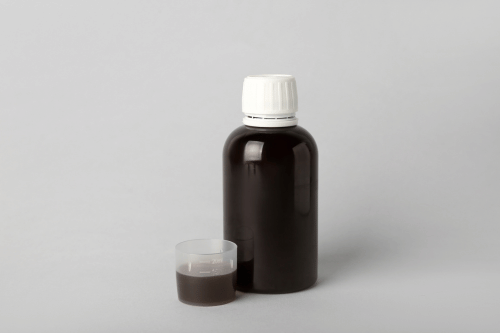

NyQuil is a widely used over-the-counter medication designed to alleviate cold and flu symptoms such as a sore throat, cough, runny nose, and fever. Despite its effectiveness in providing relief, concerns about its potential for addiction are valid, especially when it is consumed in higher doses or over an extended period. To understand whether NyQuil is addictive, it is essential to explore its active ingredients, the risks of misuse, and the warning signs of dependency.

NyQuil is an over-the-counter (OTC) medication that is commonly turned to for managing cold and flu symptoms. It contains a combination of active ingredients, including:
Dextromethorphan (DXM): A cough suppressant that helps reduce the urge to cough.
Acetaminophen: A pain reliever and fever reducer.
Doxylamine succinate: An antihistamine that induces drowsiness and helps users fall asleep.
These ingredients work together to treat multiple symptoms, offering a convenient solution for individuals battling cold or flu symptoms.
NyQuil is a widely used over-the-counter medication that contains a combination of ingredients designed to relieve symptoms of colds and flu. The main ingredients in NyQuil include:
Acetaminophen: This is a pain reliever and fever reducer that helps alleviate headaches, muscle aches, and reduce fever.
Dextromethorphan (DXM): A cough suppressant that works by affecting the signals in the brain that trigger the cough reflex, providing relief from persistent coughing.
Doxylamine: An antihistamine that helps relieve symptoms such as runny nose, sneezing, and congestion, and also induces drowsiness to help users sleep.
Phenylephrine: A decongestant that helps relieve nasal congestion by shrinking the blood vessels in the nasal passages.
These ingredients work together to provide comprehensive relief from cold and flu symptoms, including sore throat, cough, runny nose, and fever. However, when misused or taken in excess, these ingredients can have negative effects on the body, such as liver damage from acetaminophen, hallucinations from high doses of DXM, and increased drowsiness from doxylamine.
Although NyQuil is not categorized as a controlled substance, its sedative properties and the presence of DXM make it susceptible to misuse. Repeatedly taking NyQuil in excessive amounts or for unintended purposes can lead to dependency, and individuals may abuse NyQuil by increasing their intake after developing tolerance, or by combining it with other substances to enhance its effects, with significant impacts on both physical and mental health.
Dependency on NyQuil typically develops when the body becomes reliant on its sedative effects or the mind-altering properties of DXM. This dependency often leads to increasing dosages over time and persistent use even after cold or flu symptoms have subsided.

Addiction to NyQuil can manifest in different ways, including:
Physical Dependence: This occurs when the body adapts to the presence of the medication, leading to withdrawal symptoms such as nausea, headaches, and irritability when it is stopped.
Psychological Addiction: This involves an emotional or mental reliance on the medication, where individuals feel they need NyQuil to cope with stress, anxiety, or insomnia.
Tolerance: Over time, the body may require higher doses of NyQuil to achieve the same effect, leading to increased consumption and risk of overdose.
Withdrawal Symptoms: When the medication is stopped or reduced, individuals may experience physical and psychological effects, including mood swings, heightened anxiety, and flu-like symptoms.
Understanding these different levels of addiction can help individuals recognize the signs of NyQuil addiction and seek appropriate treatment.
NyQuil addiction involves a range of physical and psychological symptoms, including:
Tolerance Development: Needing larger doses to achieve the same effects.
Withdrawal Symptoms: Experiencing mood swings, heightened anxiety, and flu-like symptoms when not taking NyQuil.
Physical Symptoms: Issues such as liver damage, cognitive impairment, blurred vision, and stomach pain.
Behavioral Changes: Using NyQuil as a coping mechanism for stress, insomnia, or emotional distress.
Abuse NyQuil by taking it in large doses or for non-medical purposes can have severe consequences, including:
Liver Toxicity: Excessive acetaminophen consumption can cause severe liver damage, particularly when combined with alcohol or other medications.
Cognitive Impairment: Misusing NyQuil over time can lead to memory loss and difficulty concentrating.
Physical Dependence: The body’s reliance on the sedative effects of NyQuil can complicate recovery efforts.
Mood Swings and Anxiety: Psychological effects of NyQuil abuse can worsen over time, making dependency more difficult to break.

Dextromethorphan, a key ingredient in NyQuil, is known to produce hallucinogenic effects at high doses. The potential to abuse NyQuil arises as individuals may misuse DXM for its sedative effects, initially following the recommended dosage but increasing intake over time. This has led to its misuse, particularly among young people seeking a euphoric “high.” Repeated DXM abuse can result in severe health issues and contribute to the development of substance use disorders.
Several factors can increase the risk of developing an addiction to NyQuil, including:
Genetic Predisposition: Individuals with a family history of substance abuse may be more likely to develop an addiction to NyQuil.
Mental Health Conditions: Those with anxiety, depression, or other mental health conditions may be more likely to misuse NyQuil as a form of self-medication.
Easy Access: Individuals who have easy access to NyQuil may be more likely to misuse it, especially if it is readily available in their home.
Peer Pressure: Social influences and peer pressure can lead individuals to misuse NyQuil, particularly among younger populations seeking to experiment with its effects.
Recognizing these risk factors can help individuals take proactive steps to prevent NyQuil addiction and seek healthier alternatives for managing cold and flu symptoms.
The best way to prevent addiction is by using NyQuil responsibly and only for its intended purpose. Following the recommended dosage and avoiding prolonged use are critical steps in minimizing risk.
Follow Dosage Guidelines: Always adhere to the instructions on the packaging or provided by a healthcare professional.
Limit Duration: Use NyQuil only for short-term relief of cold and flu symptoms.
Avoid Nightly Use: Do not rely on NyQuil as a regular sleep aid.
Consult a Doctor: Seek medical advice if symptoms persist beyond the recommended period of use.
Monitor Other Medications: Be mindful of interactions with other OTC medications or alcohol.
For individuals who are struggling with NyQuil addiction or who want to avoid the risks associated with it, there are several alternative options available, including:
Natural Remedies: Options such as vitamin C supplements, Echinacea, and a mixture of honey and lemon can help boost the immune system and soothe sore throats.
Prescription Medications: For more severe symptoms, doctors can prescribe specific cough suppressants and decongestants that are less likely to be misused.
Over-the-Counter Medications: Alternatives like acetaminophen and ibuprofen can effectively reduce pain and fever without the risks associated with NyQuil addiction.
These alternatives can provide relief from cold and flu symptoms without the risks associated with NyQuil addiction, helping individuals manage their health more safely.
Addiction to NyQuil can lead to a range of harmful effects, including:
Physical Health Consequences: Chronic misuse may result in liver toxicity, blurred vision, and abdominal pain.
Mental Health Challenges: Increased anxiety, mood swings, and cognitive difficulties.
Social and Financial Issues: Dependency can disrupt daily life and relationships, and lead to legal or financial problems if combined with misuse of other substances.
When an individual stops taking NyQuil or reduces their dosage, they may experience withdrawal symptoms, including:
Nausea and Vomiting
Headaches
Fatigue
Irritability
Anxiety
Detoxification is the process of removing the medication from the body, and it can be done under medical supervision to ensure safety and comfort. Cognitive behavioral therapy (CBT) is a type of therapy that can help individuals manage withdrawal symptoms and prevent relapse. CBT is a patient-centric and goal-oriented approach that helps individuals understand the connections between their thoughts, feelings, and actions. It can be combined with medications and has shown effectiveness in treating addiction.
The exact number of CBT sessions for individuals with NyQuil addiction depends on the severity of their addiction and underlying mental health problems, typically ranging from 6 to 20 sessions. This comprehensive approach ensures that individuals receive the support they need to overcome addiction and maintain long-term recovery.
Professional help is essential for anyone struggling with NyQuil addiction. Treatment often involves a combination of medical interventions and therapy to address both the physical and psychological aspects of dependency.
Medical Detox: A supervised detoxification process to manage withdrawal symptoms safely.
Cognitive Behavioral Therapy (CBT): A therapy method that addresses the root causes of addiction and teaches healthier coping mechanisms.
Support Groups: Programs like Narcotics Anonymous offer community support and accountability.
Behavioral Therapy: Focuses on changing addictive behaviors and reinforcing positive habits.
Behavioral therapy plays a vital role in long-term recovery from NyQuil addiction. By addressing the emotional and psychological drivers behind misuse, therapy helps individuals develop sustainable strategies for managing stress and avoiding relapse.
Addiction often stems from underlying mental health challenges, such as heightened anxiety or depression. Comprehensive treatment plans should include mental health support to ensure lasting recovery.
NyQuil is a valuable medication for treating cold and flu symptoms, but its misuse can lead to dependency and serious health risks. By using it responsibly and being aware of the warning signs of addiction, individuals can safely benefit from its intended effects. For those struggling with NyQuil addiction, seeking professional help from trusted providers like Sullivan Recovery can pave the way to a healthier, addiction-free life.
Understanding the risks and taking preventive measures are crucial in ensuring both physical and mental well-being.

At Sullivan Recovery, as an in-network provider we work with most insurance plans, such as:
And More
If you or a loved one are struggling with mental health challenges or substance abuse, reach out to Sullivan Recovery today. Our team of compassionate professionals is here to support your journey towards lasting well-being. Give us a call at 949-836-7180.
Taking NyQuil every night is not recommended. Prolonged use can lead to dependency and increase the risk of liver damage and other health issues. If you struggle with insomnia, consider discussing alternative treatments with a healthcare provider.
Consuming excessive amounts of NyQuil can result in severe side effects, including liver toxicity, cognitive impairment, and even life-threatening conditions. Seek immediate medical attention if an overdose is suspected.
NyQuil should only be used for short-term relief, typically no longer than a week. Consult a doctor if symptoms persist beyond this period.
No, NyQuil does not contain codeine. Its sedative effects come from doxylamine succinate and DXM.